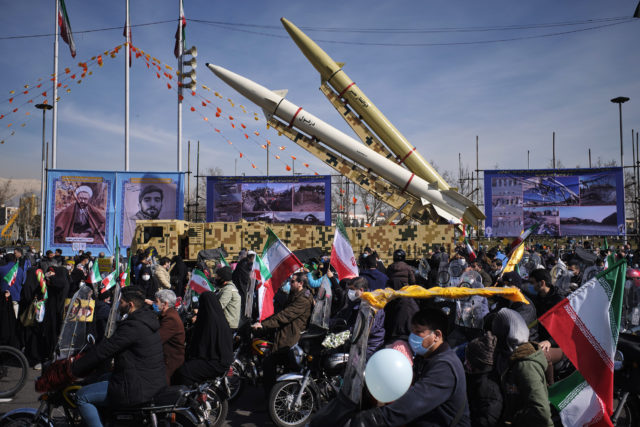
Enrique Mora, the European Union official coordinating the Vienna nuclear talks, visited Tehran this month for the purpose of enticing Iran back to the table. The Iranians had walked out after a bipartisan group of American senators objected to Iran’s demand that the Biden administration remove the Iranian Revolutionary Guard Corps (IRGC) from the U.S. State Department’s Foreign Terrorist Organization list. Recognizing that the IRGC was responsible for the deaths of hundreds of American service personnel in Iraq and the wounding of thousands more, the senators stymied the Biden administration’s hopes of appeasing Tehran.
Mora’s meetings, however, according to EU foreign policy chief Josep Borrell “had gone better than expected” and, Borrell told the G7 foreign ministers, were no longer “stalled” but “reopened.” The Iranian Foreign Ministry backed him up, saying the meetings in Tehran “have set the right course and were moving forward.”
How did Mora manage it?
According to Politico, “Western diplomats are expecting Tehran to put forward potential alternative demands, giving Washington a chance to think about other concessions it could offer. The aim is to find a way around the IRGC hurdle that will let both governments sell the deal domestically.”
Three things are of note in this account of the Biden administration’s diplomatic stance. First, its aim is not to make a deal to constrain Iranian nuclear capabilities; it is to “find a way around” the senators’ objection.
Second, its aim is not to remove the Iranian nuclear threat from the region and the world; it is to make it easier for Washington and Iran to “sell the deal” to their people.
Third, its aim is not to make Iran live up to its commitments under the 2015 nuclear deal and to the International Atomic Energy Agency (IAEA); it is to find “other concessions” Washington can make.
“Alternative demands” from Iran are not much of a deal, Mr. Mora.
Meanwhile, Russian Foreign Minister Sergei Lavrov placed the onus for restarting the talks on Washington, saying, “We are waiting for the U.S. to return to the legal framework of this nuclear deal, and we are also waiting for the lifting of the illegal sanctions.” In the interim, according to The Times of Israel, “Moscow had received guarantees from the U.S. on its ability to trade with Tehran.”
Why does Russia get to make pronouncements—let alone make demands or get guarantees from Washington?
The U.S. is not in the room at the talks, because Iran refused to sit with us. The Biden administration should have left Vienna when that happened. Instead, our EU allies, plus China and Russia, are talking with Tehran. Even after it invaded Ukraine, we relied on Russia to be our voice.
This is in line with the Biden administration’s habit of handing out bribes to get an Iranian signature on a piece of paper. The president took the terrorist designation off Iran’s Houthi proxy and withdrew American support from Saudi Arabia in the Yemen war, pressed South Korea to release frozen Iranian funds, waived sanctions to permit Iran to sell electricity to Iraq and oil to China, downgraded the Abraham Accords between Israel and Arab States concerned about Iranian threats and removed American support from the EastMed Pipeline consortium.
Those are, indeed, excellent bribes, but Iran wants more.
Now Iran insists that the 2019 State Department designation of the IRGC as a terror organization be lifted. This would have some implications for the organization, although the U.S. government has considered the IRGC a terrorist organization since 2007, when the Quds Force was first listed by the Treasury Department, followed later by other listings. Only President Donald Trump‘s terror designation appears at issue—presumably because the Iranians thought the Biden administration would be happy to undo another piece of Trump administration policy. But for the senators’ objection, they might have been right.
President Barack Obama was wrong when he said the alternative to his 2015 nuclear deal “is war.” That deal, unsigned by either Iran or the U.S., ran concurrent with a war started by Iran decades before. Iran and its proxies, through overt and covert conventional activity, have killed hundreds of thousands of people combined in Syria, Lebanon, Iraq, Yemen, Saudi Arabia, Israel and elsewhere. Iranian precision missiles have been exported to militias in Iraq, as well as to Hezbollah and proxy groups in Syria, Gaza and Yemen. Tehran’s first covert nuclear program was discovered in 2002 and a second one in 2009. The IAEA announced in 2011 that “Iran has carried out activities relevant to the development of a nuclear explosive device.” Much of what we thought we knew—or knew we knew—was confirmed in 2018 when Israel stole nuclear archives from Tehran.
Iran is a conventional and nuclear menace in the Middle East and beyond. It should not be offered the opportunity to press for additional concessions from America and the West—and the Biden administration should stop begging.





